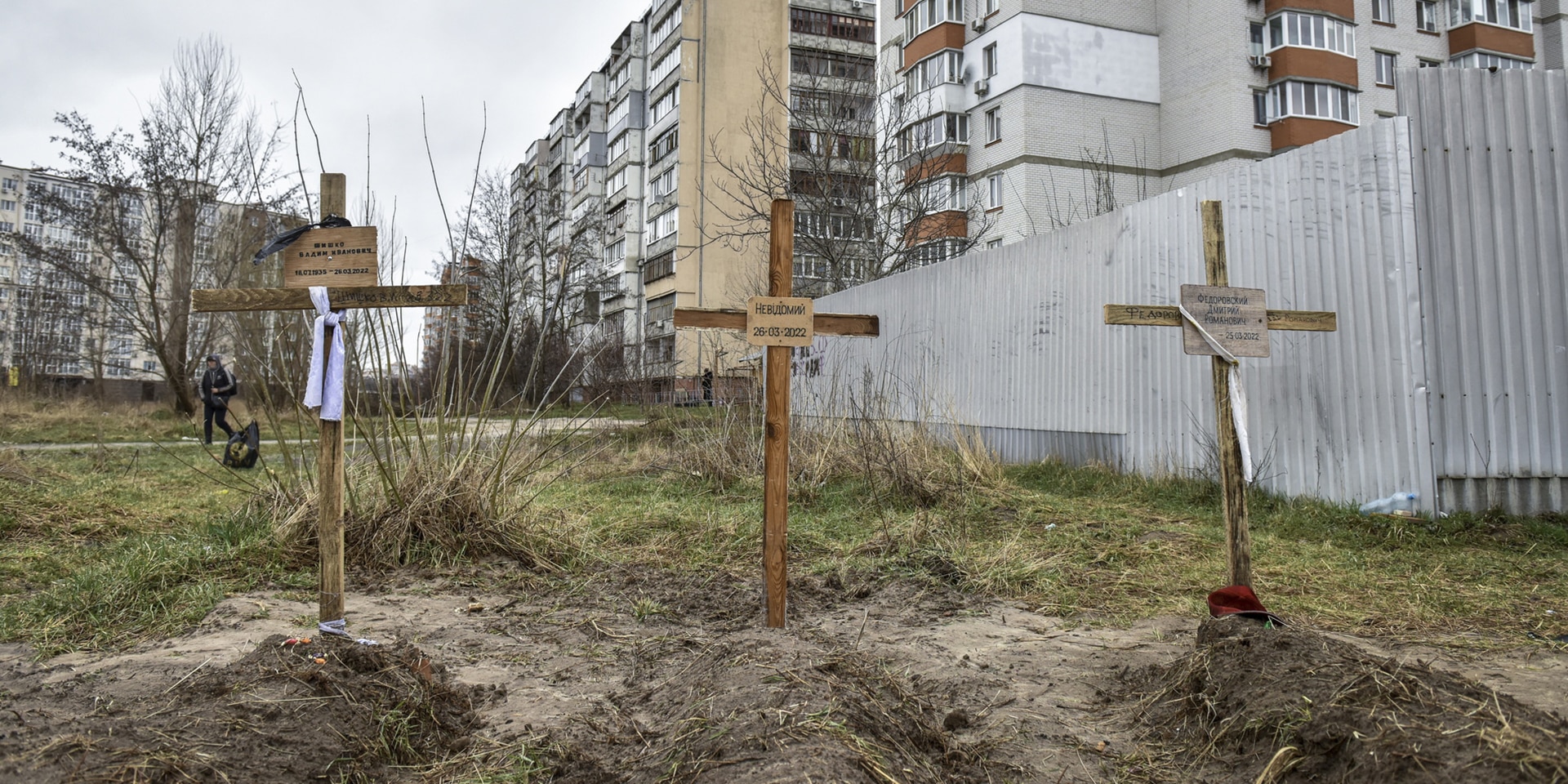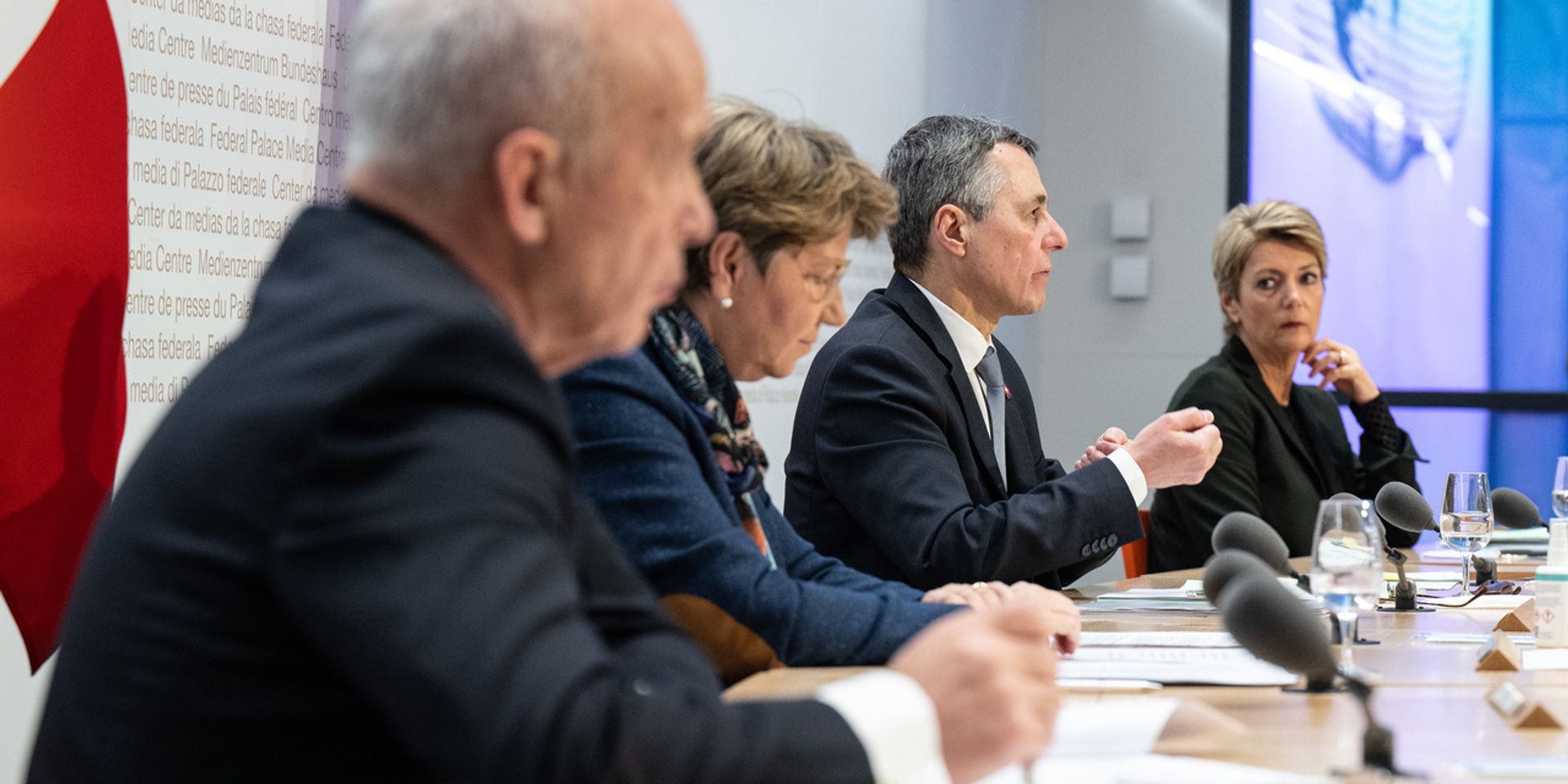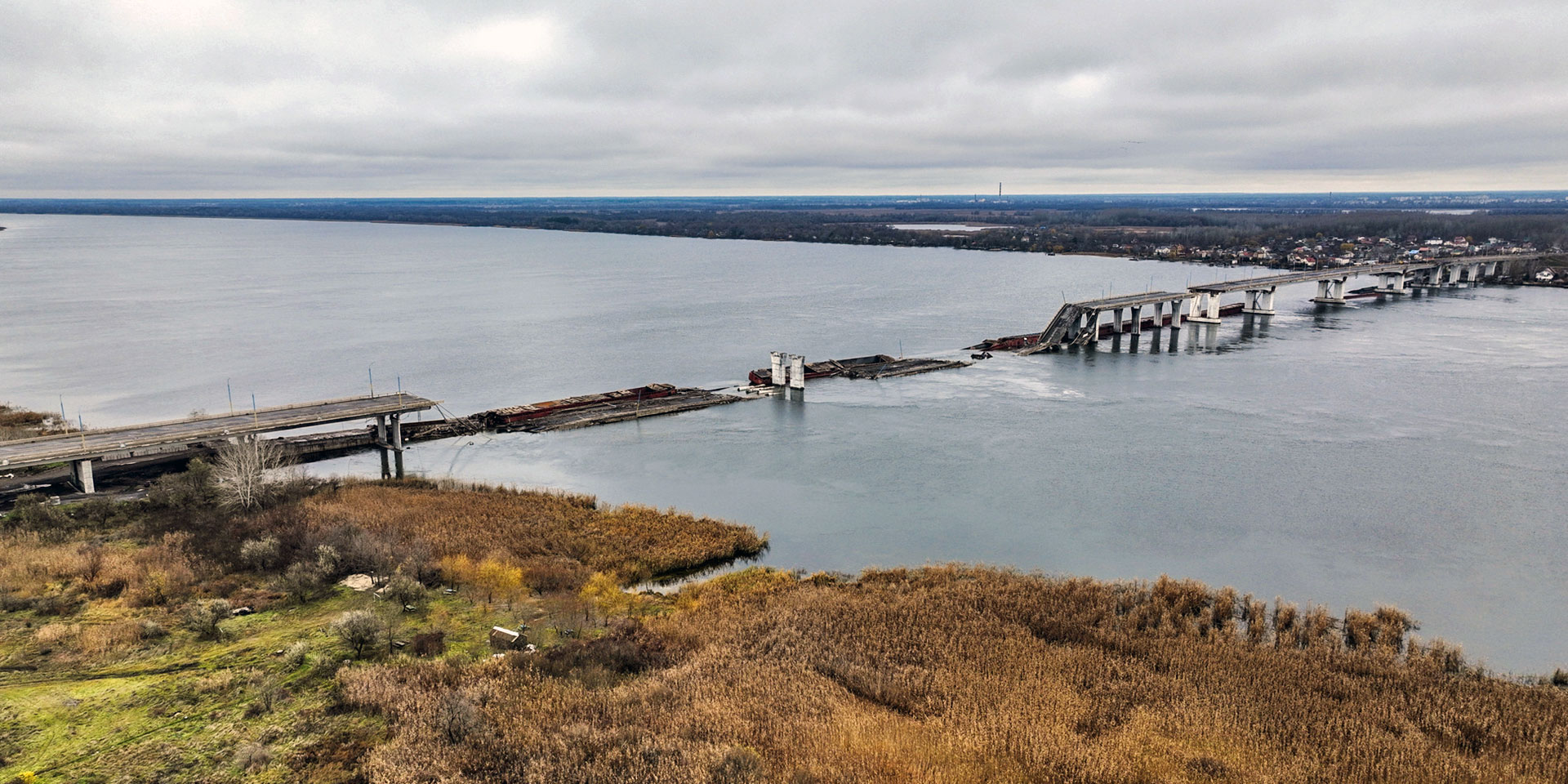War crimes investigation in Ukraine
There are clear indications of war crimes in Bucha and other places in Ukraine. The International Criminal Court is investigating the reports. Switzerland supports its investigation. This Q&A focuses on the role of the International Criminal Court and on how such investigations are carried out.

Three graves of people who were shot in Butcha. Switzerland demands that indications of war crimes be investigated by independent organisations. © Keystone
“Armed conflict”, “Civilians”, “War crimes”
How does international humanitarian law define these and other terms? What is their meaning in the context of international criminal justice? A glossary answers these questions.
What does the FDFA say about the allegations that war crimes have been committed in Bucha and other places in Ukraine?
President Cassis and the FDFA are deeply concerned by the horrific images from Bucha and reports from other places in Ukraine, which point to possible war crimes. Switzerland condemns violations of international humanitarian law and human rights in the strongest possible terms. Indications of such violations must be independently investigated and the alleged perpetrators must be prosecuted in order to obtain justice for the victims. This is a foundation for sustainable peace. Switzerland pro-actively supports such investigations.
What exactly does international humanitarian law proscribe?
International humanitarian law protects the victims of armed conflicts and restricts the means and methods of warfare. Attacks targeting civilians or civilian objects are prohibited, as are indiscriminate attacks. Examples of indiscriminate attacks include the use of cluster munitions and other explosive weapons in populated areas where their effects cannot be limited, nor directed at a specific military objective.International humanitarian law also stipulates that prisoners of war and other detainees must be protected and treated humanely.
The FDFA calls for an independent international investigation into the atrocities committed in Bucha and mentions the International Criminal Court (ICC) in this context. What role can the ICC play here?
The ICC has already opened an investigation into the situation in Ukraine. A team of investigators is gathering evidence and assessing it. In its investigations, the ICC looks into credible allegations of war crimes and other crimes under international law. The ICC's chief prosecutor decides independently and impartially which indications of potential crimes will be investigated. However, the ICC can only prosecute individuals, not states.
Can the ICC indict President Putin? Whose decision would that be?
The chief prosecutor can investigate war crimes and crimes against humanity in Ukraine. If the chief prosecutor finds evidence of the Russian president's culpability, he could indict him and issue a warrant for his arrest. Should an arrest warrant be issued, the ICC would not be able to execute it itself – for example, it does not have its own police force; it would instead be obliged to rely on the cooperation of its member states. The latter are obliged to enforce an arrest warrant issued by the ICC.
What does it take for the International Criminal Court to open an investigation? Is, for example, a request from Switzerland sufficient?
Switzerland, like any of the other 123 states parties, may request the chief prosecutor to carry out an investigation. And Switzerland has done so: on 2 March 2022, together with 40 other states, it referred the situation in Ukraine to the ICC. This allowed the chief prosecutor to open an investigation immediately. In addition, it was a signal from the referring states that war crimes must not go unpunished. The chief prosecutor may also proceed with an investigation on the territory of a state party on his own initiative, but this process takes longer. In both cases, the state concerned must have accepted the jurisdiction of the ICC.
A third way for an investigation to be opened is through a UN Security Council referral. In the situation at hand, this is unrealistic due to Russia's veto power.
Are Russia and Ukraine also states parties to the ICC?
No, neither Russia nor Ukraine have ratified the Rome Statute, which is the foundation of the ICC. However, after the annexation of Crimea in violation of international law, Ukraine recognised the jurisdiction of the ICC through a declaration. On that basis, the ICC can investigate war crimes, crimes against humanity and, in theory, genocide if those crimes were committed in Ukraine after November 2013. The chief prosecutor's investigation first focused on the situation in Crimea and eastern Ukraine, but he has now expanded it to cover the whole of Ukraine.
How long do such investigations take?
That is impossible to predict. They can take several years. But the ICC's chief prosecutor has already sent a team of investigators to Ukraine. This team is investigating crimes committed since 2013. The FDFA expects that the team will also investigate the situation in Bucha. The chief prosecutor himself also travelled to Ukraine and Poland in early March 2022. Once the chief prosecutor has enough evidence, he will issue arrest warrants. Trials do not begin until the persons for whom arrest warrants were issued have been handed over to the ICC.
Could experts from Switzerland also be involved in such investigations?
Switzerland's Office of the Attorney General has established a task force on Ukraine and Russia with a focus on international criminal law, among other things. It has – working closely with the Federal Office of Police (fedpol) and the State Secretariat for Migration (SEM) – taken measures to gather and secure any information or evidence on crimes under international law. The task force is also maintaining exchanges with the ICC.
Has the International Criminal Court conducted such investigations in other situations in the past? If so, where and with what results?
The ICC has, fundamentally, jurisdiction in cases of genocide, crimes against humanity, war crimes, and the crime of aggression, i.e. the most serious crimes of all, and prosecutes individuals. It is currently reviewing 20 situations worldwide and there are 22 cases under way. In the past, the ICC has found some individuals guilty and acquitted others. The ICC has proven that it is independent and upholds rigorous standards of criminal justice.
Are there other institutions besides the ICC that could conduct such investigations?
States themselves are primarily responsible for investigating and prosecuting alleged war crimes in keeping with international standards. The ICC can only exercise its jurisdiction on a subsidiary basis, i.e. when the states concerned are unwilling or unable to prosecute the crimes themselves.
In addition, there are international investigative mechanisms that, for example, gather evidence and provide it to the national and international accountability mechanisms concerned, such as the ICC. The UN Human Rights Council, for example, has created a Commission of Inquiry on Ukraine. Switzerland supported this initiative during the special session of the Human Rights Council.
Switzerland also supported the activation of the Moscow Mechanism within the Organization for Security and Co-operation in Europe (OSCE). This mechanism is also gathering evidence of war crimes in Ukraine and providing it to national and international prosecution authorities (e.g. the ICC). Furthermore, Switzerland continues to support the UN Human Rights Monitoring Mission in Ukraine, which has been deployed since 2014. The Mission is operating on the ground, investigating human rights violations.
The accusation of genocide has now been made in relation to the war crimes in Ukraine. What is Switzerland's position on this?
The assessment of certain atrocities as 'genocide' is, fundamentally speaking, the responsibility of courts and international bodies with a corresponding mandate. The international community defined the term 'genocide' in the Genocide Convention of 1948. 'Genocide' requires specific genocidal intent, which is extremely difficult to assess and introduces significant obstacles. This intent must, in principle, be proved in an independent and impartial procedure. Indications of such violations must generally be independently investigated and the alleged perpetrators must be prosecuted to obtain justice for the victims.
Switzerland condemns any statements that, for example, deny Ukraine's right to exist or call for the collective punishment of parts of the Ukrainian population. We call on all those responsible to refrain from spreading hate speech and disinformation that further fuels the conflict.


